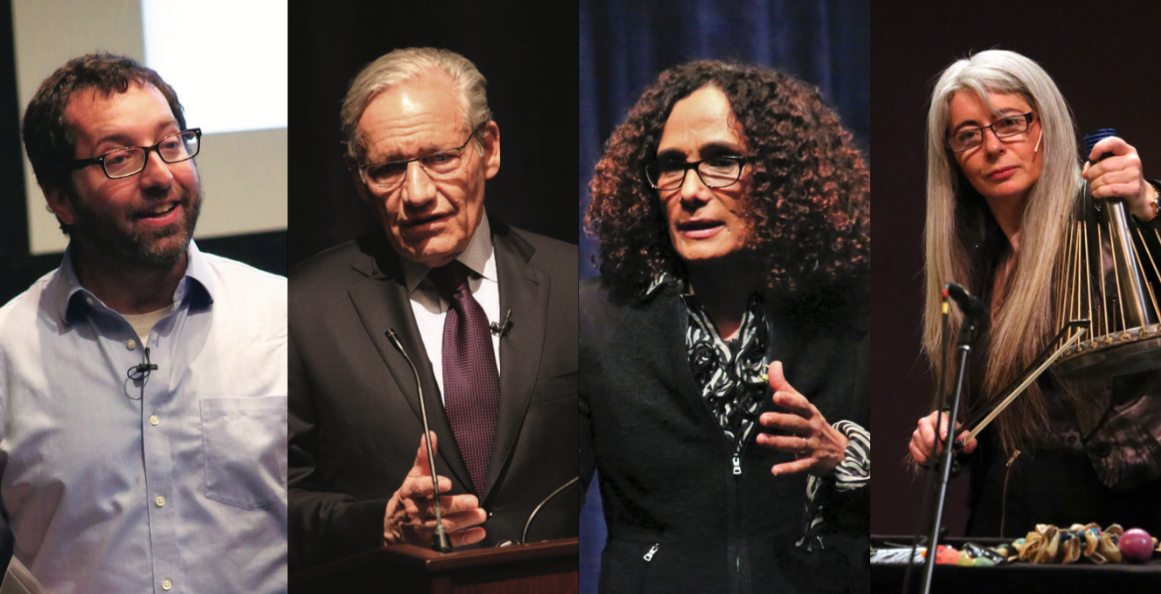
Pictured from left to right: Dr. Jordan Ellenberg, Mr. Bob Woodward, Dr. Tricia Rose, and Dame Evelyn Glennie.
Most students’ understanding of how a special program speaker is selected may likely be summed up by Mr. Kevin Roger’s, Choate’s Director of Studies, humorous explanation: “We reach out and negotiate and then ba-da-bing-ba-da-boom we have a speaker.” But, of course, “ba-da-bing-ba-da-boom” takes tremendous resources, time, and effort to achieve.
Inviting a Speaker
The Special Programs Committee is tasked with selecting speaker candidates and arranging the corresponding programs. The Committee is chaired by Mr. Rogers and consists of the various directors of individual programs, Coordinator of Special Programs Ms. Leigh Dingwall; Dean of Faculty Ms. Katie Levesque; Dean of Students Mr. James Stanley; and representatives from the Heads Office and Development Office.
The speaker selection process often begins a year in advance. According to Mr. Rogers, the Committee has to consider “what the mission is, how much money we have to spend, and then, usually the hardest part, meshing speakers with a date that will work.”
There are many ways a potential speaker can be brought to the Committee. Sometimes program directors coordinate with department heads to brainstorm ideas. Other times, a student, alumnus, or family with connections suggest speakers or help lower costs.
Candidates are evaluated by the Committee for their societal contributions and their level of fame. Speakers who are too well-known are notoriously expensive as a result of their high demand. Mr. Rogers said, “I think that people would be amazed at what someone gets paid to speak for an hour. Whether it’s Hillary Clinton or George W. Bush, you’re talking about a quarter of a million dollars. We don’t have those kinds of resources.”
Charles Krause ’51 Fellow in Rhetoric
This lecture series is part of a fund provided by Mr. Charles Krause ’51, who was a debate captain while at Choate. The program is run by Mr. John Connelly and Ms. Lorraine Connelly.
According to Mr. Connelly, each year, an academic department invites a speaker to campus “who has made a distinguished contribution in his or her field and whose personal example may inspire others.”
The Krause series brings speakers from all walks of life to campus. In 2014, the arts department hosted Dame Evelyn Glennie, a deaf percussionist, who spoke about listening and demonstrated her skill with a myriad of instruments.
This year, the science department is inviting environmentalist Dr. Bill McKibben to speak on April 18, 2017.
Ambassador S. Davis Phillips ’61 Family Lecture
Founded in 1996 by Choate alumnus and parent Ambassador S. Davis Phillips ’61, this lecture series invites speakers who have demonstrated considerable leadership through their contributions to the greater community.
Often, these speakers relate to then-current events. For example, during the 2000 – 2001 academic year, Choate hosted a debate among political operatives and media correspondents involved in the 2000 presidential election. These included Ms. Andrea Buchanan, the campaign chairperson of Mr. Pat Buchanan; Ms. Susan Bysiewicz, the Connecticut Secretary of State, who represented Mr. Al Gore; Mr. Rich Lowry, the editor-in-chief of the National Review, who represented President George W. Bush; and NBC reporter Ms. Duby McDowell ’78, who served as moderator.
Because the purpose of this series is fairly broad, Choate has been able to invite a wide range of speakers, ranging from professors to architects to Pixar animators.
Thalheimer Educator-in-Residence Program
Mr. Joel Backon is the director of this lecture series, which is funded by the Thalheimer family. “Initially, the requirement was that the speaker speak on an issue that had to do with Judaism, Israel, or the Middle East,” explained Mr. Backon. However, the family has recently broadened the scope.
A speaker is invited biannually, and so far, eight Thalheimer speakers have come to Choate. A ninth, Mr. Nicholas Kristof, an op-ed columnist for the New York Times, will come later this year.
In recent years, beginning with Mr. Bob Woodward, an investigative reporter for The Washington Post, who came in 2015, the Committee adopted a new format for the special program. The speaker now lectures for only 15 minutes and then a few students interview the speaker with prepared questions, followed by a question-and-answer session with the student body as a whole.
As for the “educator-in-residence” portion of the program, Thalheimer speakers are generally required to spend the entire day at Choate, meeting with classes and groups of students.
Adlai Stevenson ’18 Lecture
This lecture series is endowed by Mr. Martin Koldyke, a Choate parent who started the fund in 1976 to honor Mr. Adlai Stevenson II ’18. Mr. Stevenson had a successful career in politics and public service, including serving as the governor of Illinois.
Every year, the HPRSS department selects a speaker, called a “Stevenson Fellow,” who, like Mr. Stevenson, has a distinguished career in public service and is involved with politics. Last year, for example, the Stevenson Fellow was Mr. Matthew Dunne ’88. Mr. Dunne has a diverse background; he has served in the Vermont State Senate, worked for Google, and been involved with the AmeriCorps VISTA program, a national service program designed to alleviate poverty.
This year, HPRSS Department Head Ms. Amy Foster and HPRSS teacher Mr. Charles Hopkins will collaborate to choose the next Stevenson Fellow.
In addition to a speaker, a Choate student is selected as a Junior Fellow to give a brief overview and analysis of the life of Mr. Stevenson before the lecture.
Of course, these programs are only a sampling of those in place. Over the years, speakers have encompassed a wide variety of backgrounds, such as college professors, war veterans, architects, and writers. Despite obstacles, the Committee, with the help of generous donors, never fails to present speakers who deliver dialogue-inciting speeches.




